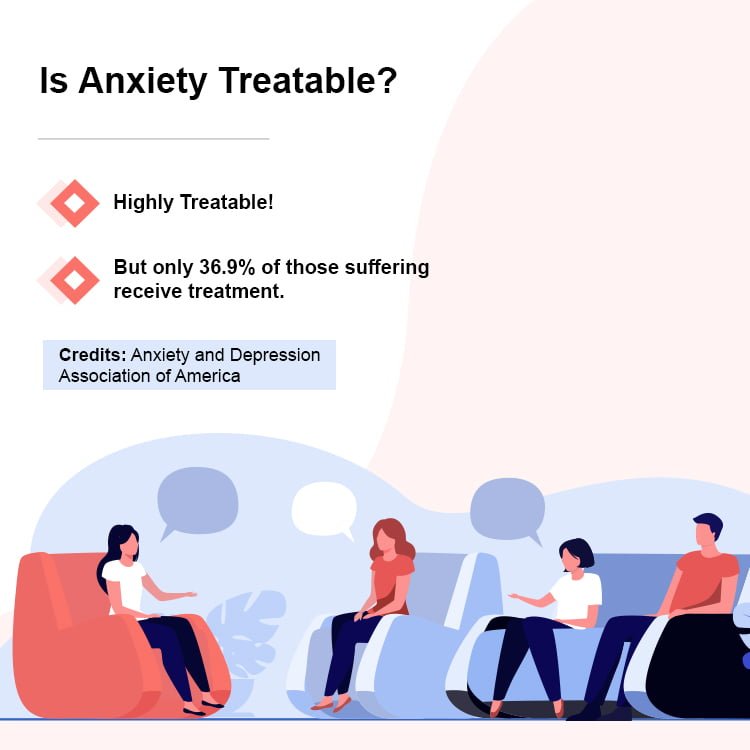What Is Anxiety?
Anxiety is a bodily and mental reaction to situations that are stressful, unfamiliar, or dangerous.
Table of Contents
ToggleGenetically speaking, your DNA has a substance called telomerase. Ever had a shoestring unraveled? Well, that’s what happens when the tape comes off. When you are stressed, the telomeres which keep the “shoestring” of your DNA together unravel.
Stress actually “unravels” your DNA through telomerase reduction–it literally ages you. Accordingly, there are a variety of effects that develop physically and mentally.
The Effect Of Anxiety On The Body Has Multiple Expressions
Not all people experience the physical and mental effects of anxiety the same. Some develop ticks (an eyelid that twitches perniciously); some withdraw from society and self-isolate. Different personalities have different reactions, but regardless, to some degree, anxiety, and stress can cause the following physical issues:
- Headaches
- Poor Sleep
- Exhaustion
- Muscular Aches
- Hyperventilation
- You Start To Sweat
- Increased Heart Rate
- Trembles–Your Hands May Shake
- Appetite Reduction And Upset Stomach
- Choking–The Throat Tightens, Making Speech Difficult
- Reduction In Immune System Vitality, Increasing Illness
- Substance Abuse As An “Anodyne,” And Subsequent Bodily Damage
Headaches
When you’re anxious, this can cause the blood to pump in your head. You may develop a migraine. Chronic migraines could dovetail from anxiety. If you notice sometimes someone annoys you so much you get a headache, you know just how true this is.
The key is recognizing what makes you anxious and developing coping mechanisms to offset that feeling.
Poor Sleep
When you’re anxious, you don’t sleep right. You may not necessarily lose sleep; you could seek sleep as a means of shutting out the world. Depression often involves a lot of sleep for this reason, and depression can develop from anxiety.
Sleep disorders have a variety of negative effects that shouldn’t be ignored and can lead to worse conditions over time.
Exhaustion
Emotional exhaustion is also the fallout of anxiety. When you get into an anxious situation, it will cause blood to pound through your body. This has direct and indirect effects. You’re likely to feel tired if you’ve been anxious for any period of time.
Muscular Aches
Fatigue and exhaustion can make your muscles achy. Have you ever caught a cold and felt that weak feeling? Well, anxiety can do the same thing. It depletes you from the cellular level, and your muscles ache.
Hyperventilation
Certain anxiety will cause you to breathe fast. You’ll hyperventilate. Hyperventilation can cause headaches, it can cause you to pass out, and it can be uncontrollable as anxiety ratchets up your breathing irregularity.
You Start To Sweat
When you’re aching, hyperventilating, and exhausted, you may start to sweat. You might sweat so much you run out of sweat and get a headache from dehydration.
Increased Heart Rate
Hyperventilation increases your heart rate. You may feel your heart pounding. The more surprised or anxious you get, the worse this becomes. Panic can release adrenaline into your system, which can trigger an instinctual flight or fight response.
Trembles–Your Hands May Shake
With adrenaline and oxygen saturating your blood, your hands may begin to shake. Sometimes anxiety makes this something you have difficulty consciously controlling.
Appetite Reduction And Upset Stomach
Your stomach may ache, or you may feel nauseous. Ever lied, and knew it, and confronted the person to whom you lied? Do you know that sick feeling? That’s anxiety. It can happen if you’re not the one who did something “wrong,” too. Like if you’re in an airport and your flight gets delayed–that sinking feeling in your stomach is anxiety.
Choking–The Throat Tightens, Making Speech Difficult
Your throat may get tight; you may stutter–or have to clear your throat–when speaking in a situation that makes you anxious.
Reduction In Immune System Vitality, Increasing Illness
Adrenaline, trembling, hyperventilation, poor sleep–these diminish your body’s ability to defend itself against illness. If you’re anxious in a sustained way for a long period of time, you’re likely to get more sick more often.
Substance Abuse As An “Anodyne,” And Subsequent Bodily Damage
Owing to the psychological and physical impacts of anxiety, substance abuse is possible. Addiction to controlled substances can further weaken your body and foster dependency, which leads to anxiety.
Further Study Into Anxiety And The Body
On our website, you can find more information on medical conditions, anxiety, stress, and how such things impact you. In a nutshell, between the actual physical effects of anxiety, and collateral ones which produce physical issues, there’s a lot that anxiety can do to reduce your overall health.
Don’t be anxious. Avoid worrying. Avoid stress–as best you can, anyway. There are always situations that will try your patience or stretch your thresholds of endurance, but in day-to-day life, if you’re conscious about not being anxious, you can do much to preserve your health from the genetic level up.

